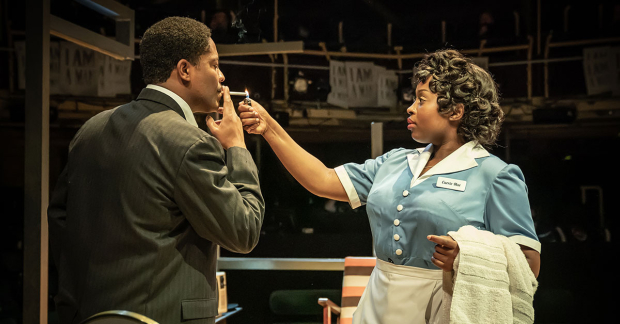The Mountaintop at the Royal Exchange – review

© Marc Brenner
Joint artistic director Roy Alexander Weise is making his Royal Exchange debut with the play – which helped him receive the JMK Award in 2016. His familiarity with the piece produces superbly detailed performances from his cast, who play Martin Luther King Jr and an enchanting maid on the last night of his life at the Lorraine Motel.
The metal grey frames of Rajha Shakiry's set evoke shackles and prison-bars. They're incomplete, unfulfilled fragments of structures left unfinished – skeletal suggestions of what could've been. They're also surreal, along with the clouds of cigarette smoke that percolate the air and stain the floor – a haze-like aura surrounding this iconic figure. Dreams – a famous motif of his speeches – are evident in the glowing blues and oranges of Lizzie Powell's lighting.
The unprepossessing motel room lacks grandeur. It reflects the modesty and mundanity of King's behaviour: he practises a speech at the toilet, then fusses over his moustache and holes in his socks. He's a normal man caught up in an unruly larger force of urgent political dilemmas and furious campaigning. The "I am a man" placards that encircle the stage are a reminder of his duty and its burden, resembling a crowd beckoning him to perform it and serve their demands.
The play doesn't idolise King but presents him as flawed. When he berates the maid, Camae, for blaspheming, she reminds him of his infidelity. His romantic passion interferes with moral campaigning and righteousness, complicating his sermonising about "the heart's conscience`' and "love is the most radical weapon". We see the toll, death threats inducing a state of paranoia which equates thunderclaps to exploding bombs.
This is all beautifully rendered in Adetomiwa Edun's performance. His lines are delivered with the emphatic tones and precise movements of a speechmaker trying to meet the weight and expectation of his status. He also imbues nobility, his hand fixed to his waist, led by his parading chest. His range is remarkable. When he conveys acceptance about mortality, his voice's thunderous reverberations deflate into timid ripples, and his posture falls from taut and proud. "I am a man" begins as an indignant warcry, but becomes a simple statement of his human fallibility: "I am just a man."
While he's erudite and distinguished, she's audacious and sultry. Ntombizodwa Ndlovu perches on the end of beds with crossed legs and finishes her lines by coolly looking down at the floor with a smug, teasing allure. However, Hall's innuendos often undermine the gravitas: when he worries about the movement dying with him, she remarks "Like most men, you can't finish what you started."
She perfectly captures Hall's idea that King echoed the ordinary people's voice. When she puts on his blazer to give her own speech, she emulates his gesticulating and elongated vowels. As a bed becomes a pulpit, the scene conveys how anyone can pick up the mantle, as it's a widely felt experience for which he's merely the mouthpiece. It's reinforced by her delivering a rousing climactic speech overlayed with a montage of historical footage tracing the assassination's aftershocks as the baton is passed on through to the present day.
There's a gear-change with the interruption of the metaphysical, which also diverges the themes from questions of race and rights. And the tension between existentialism, politics and romance can jolt you out of the human drama. But it reaches one of the most compelling summits I've seen with its closing audience address imploring us to overcome the mountain of inequality we've yet to climb.










